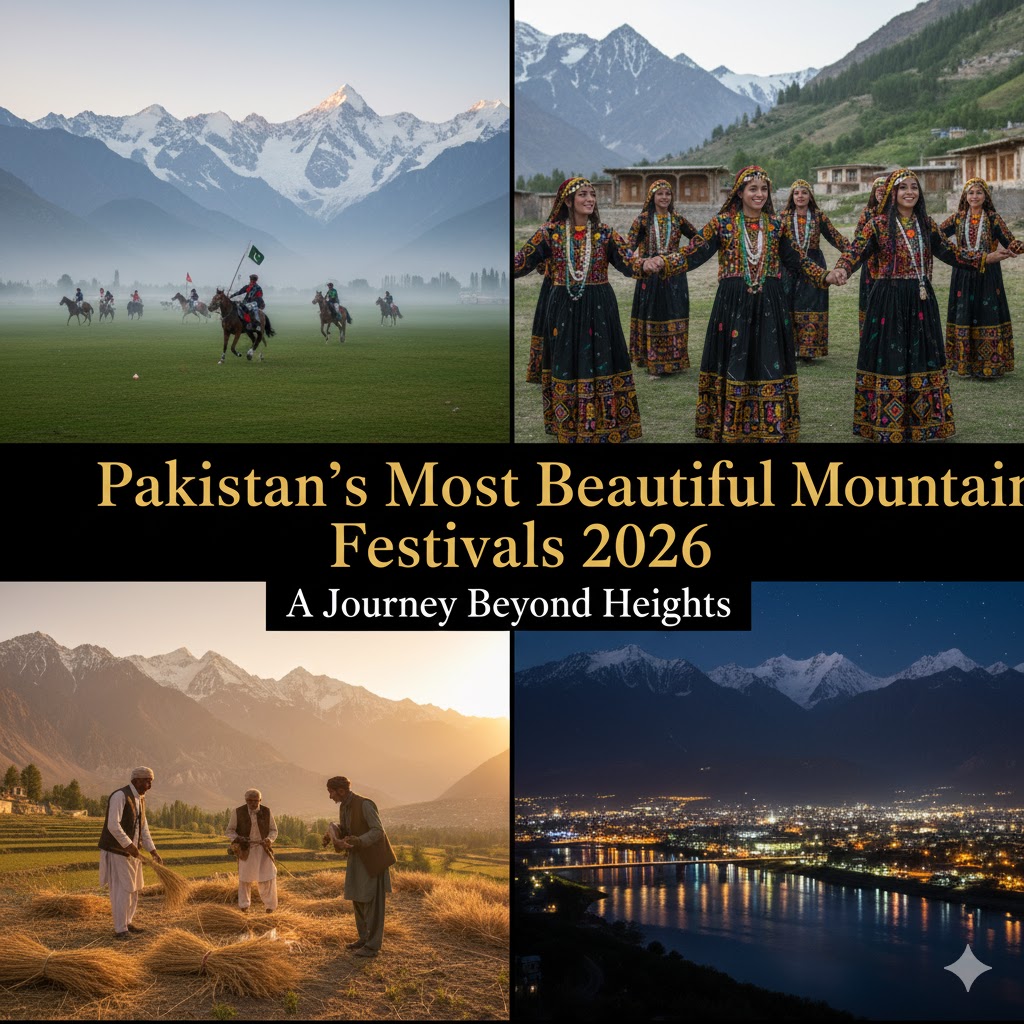Introduction — Where Culture Touches the Clouds
Most Beautiful Pakistan Mountain Festivals are more than celebrations — they are living stories of culture, courage, and connection among the world’s highest peaks. From Hunza’s Ginani to Kalash’s Chilam Joshi, each event reveals the country’s soul where tradition meets the sky. This guide uncovers their origins, highlights, and local secrets for travelers planning the 2026 mountain season.
High above the plains, where glaciers glimmer and valleys sing, Pakistan’s northern mountains host some of the world’s most breathtaking cultural festivals. Each event blends ancient rituals, music, dance, and prayer — all surrounded by dramatic peaks that mirror the spirit of their people.
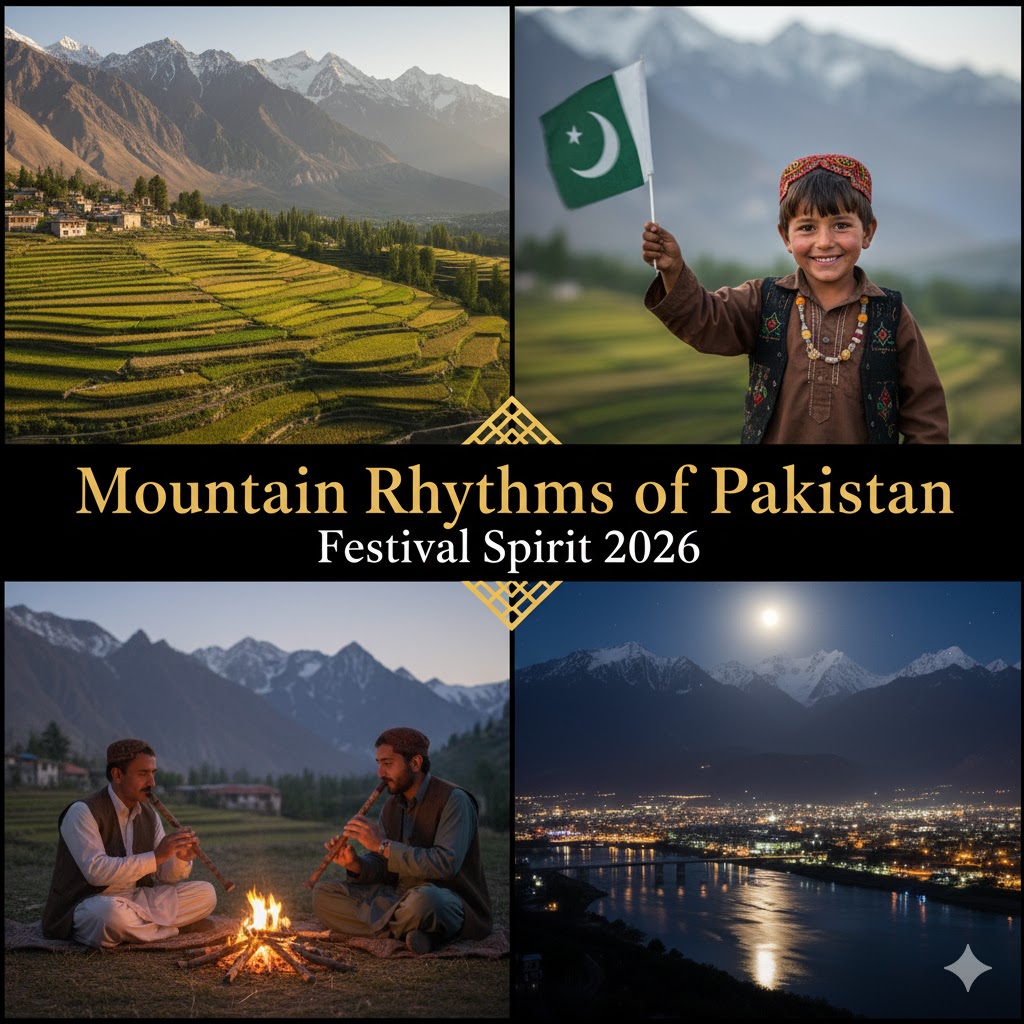
1. Chilam Joshi Festival — The Colorful Spring of Kalash Valleys
Location: Bumburet, Rumbur & Birir Valleys, Chitral
Dates: 13th–17th May 2026
The Chilam Joshi Festival, also called Joshi, welcomes the arrival of spring and marks the renewal of life among the Kalash — Pakistan’s last remaining pagan community.
It celebrates fertility, harmony, and gratitude toward nature’s spirits. Women wear handwoven black robes adorned with vibrant beads and the iconic shushut headgear, while men dress in white shalwars and colorful woolen caps.
The air fills with the sound of traditional dhol drums as villagers form dancing circles around bonfires, symbolizing joy and unity.
Highlights:
- Ritual offerings of milk to nature deities symbolizing purity.
- Communal dances celebrating love, prosperity, and seasonal rebirth.
- Local foods like Tikki bread and Kalash wine prepared with ancient methods.
- Elders narrate myths of Balimain, the spirit said to visit during Joshi.
Visitor Tips:
📍 Main Venue: Brun Village, Rumbur Valley.
🎟️ Entry: Free, but small donations to community fund are welcomed.
🛏️ Stay: Kalash Home Guesthouse or Ayun Fort Inn (20–30 min drive).
🚗 Access: From Chitral City (2.5 hrs by jeep).
💡 Local Insight: Avoid taking photos during rituals without consent; respect sacred sites.
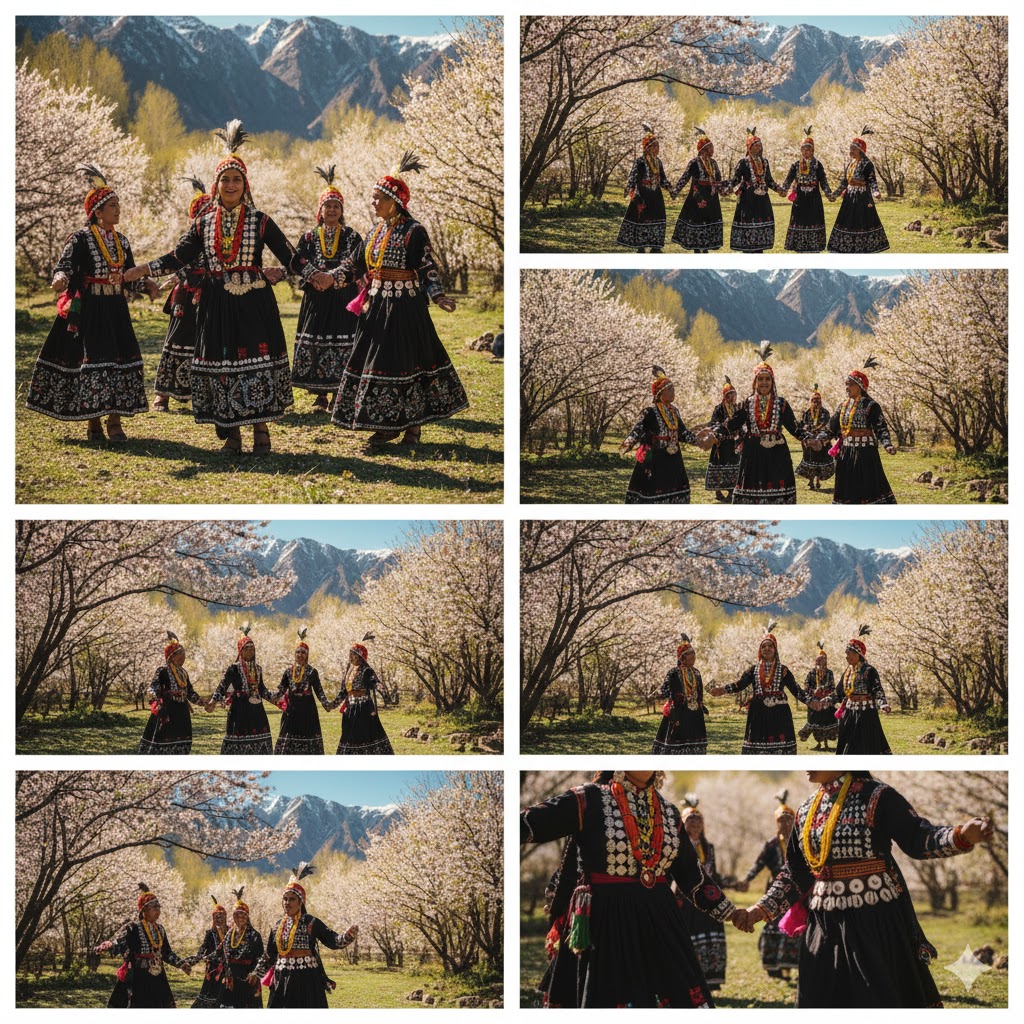
🌾 2. Ginani Festival — Hunza’s Ancient Thanksgiving Ceremony
Location: Karimabad & Altit, Hunza Valley
Dates: 21st June 2026
Ginani, celebrated for over seven centuries, is Hunza’s festival of gratitude — marking the start of the wheat harvest. The day begins with prayers led by spiritual leaders and blessings offered over freshly harvested grain.
Families gather in courtyards and fields, sharing traditional dishes like Diram Phitti (wheat cake sweetened with apricot oil) and Chap Shuro (stuffed flatbread).
At Altit Fort, villagers dance to the beat of daman drums and surnai flutes, while sword dancers (Dumal) perform centuries-old routines symbolizing victory over hardship.
Highlights:
- Held at royal forts — Altit & Baltit — against a backdrop of snow peaks.
- Traditional songs narrate gratitude to nature and ancestors.
- Guests can join communal meals after prayers.
Travel Info:
📍 Main Venue: Altit Fort Lawn, Karimabad.
🎟️ Entry: Free, but donations to Baltit Heritage Foundation appreciated.
🛏️ Stay: Hunza Serena Inn or Hunza Hidden Paradise Hotel.
🚗 Access: 3-hour drive from Gilgit Airport.
💡 Hidden Gem: Visit the “House of Wonders” near Altit for traditional food tastings and local folklore.
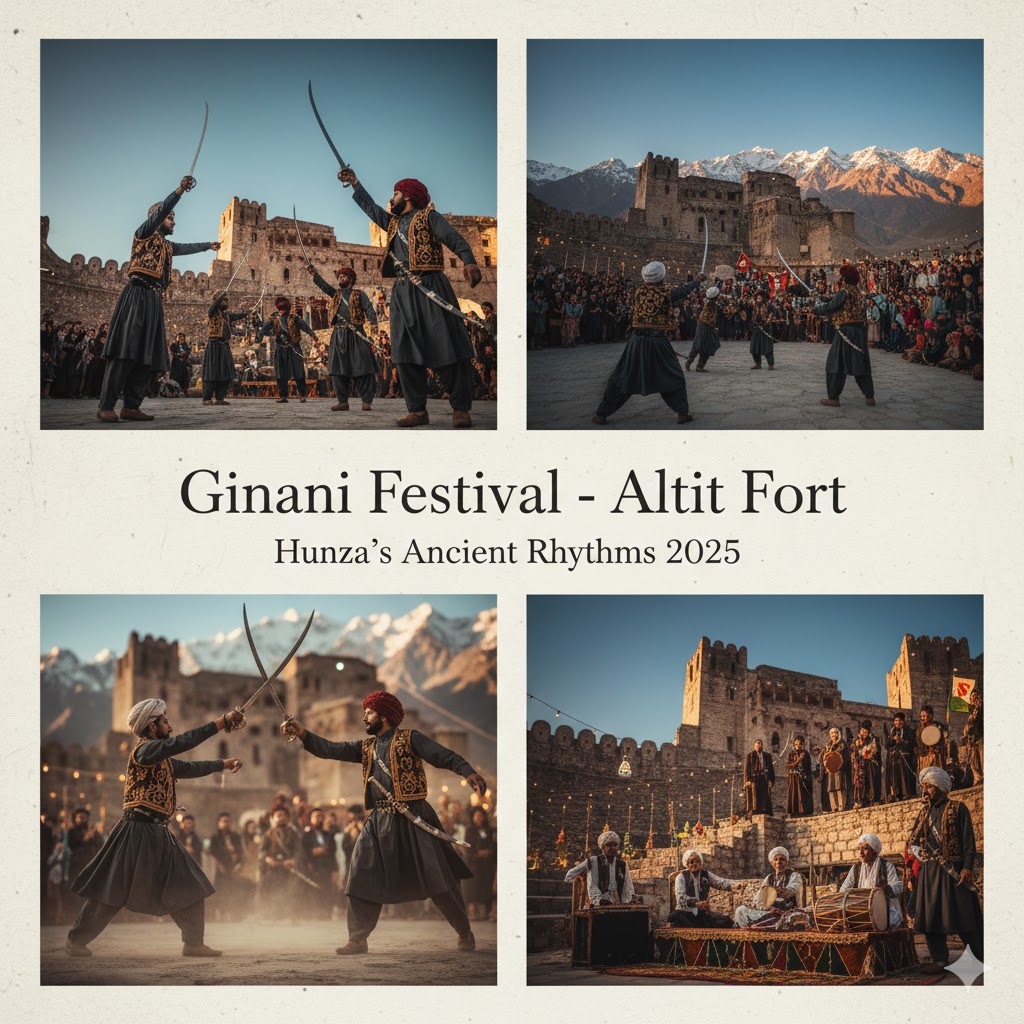
🐎 3. Shandur Polo Festival — Battle of Kings at the Roof of the World
Location: Shandur Pass (between Chitral & Gilgit)
Dates: 5th–7th July 2026
The Shandur Polo Festival transforms the world’s highest polo ground (12,000 ft) into an arena of passion and pride. The traditional rivalry between the Chitral and Gilgit polo teams is fierce yet festive — played without modern rules, keeping the sport’s ancient spirit alive.
Spectators set up camps around the turquoise Shandur Lake, surrounded by snow-clad peaks. Bonfires, folk music, and tribal dances light up the nights, turning the cold plateau into a carnival of warmth and color.
Highlights:
- Polo matches symbolizing honor and sportsmanship.
- Folk performances from both valleys after sunset.
- Cultural stalls selling gemstones, caps, and local cuisine.
Travel & Hospitality:
📍 Altitude: 12,200 ft — carry oxygen and warm layers.
🎟️ Entry: Free (VIP passes available from GB Tourism Office).
🛏️ Stay: Camping only; bring tents or rent from PTDC.
🚗 Access: Jeep tracks from Chitral (7 hrs) or Gilgit (8 hrs).
💡 Local Tip: Attend the night before opening day — local drummers rehearse till dawn.
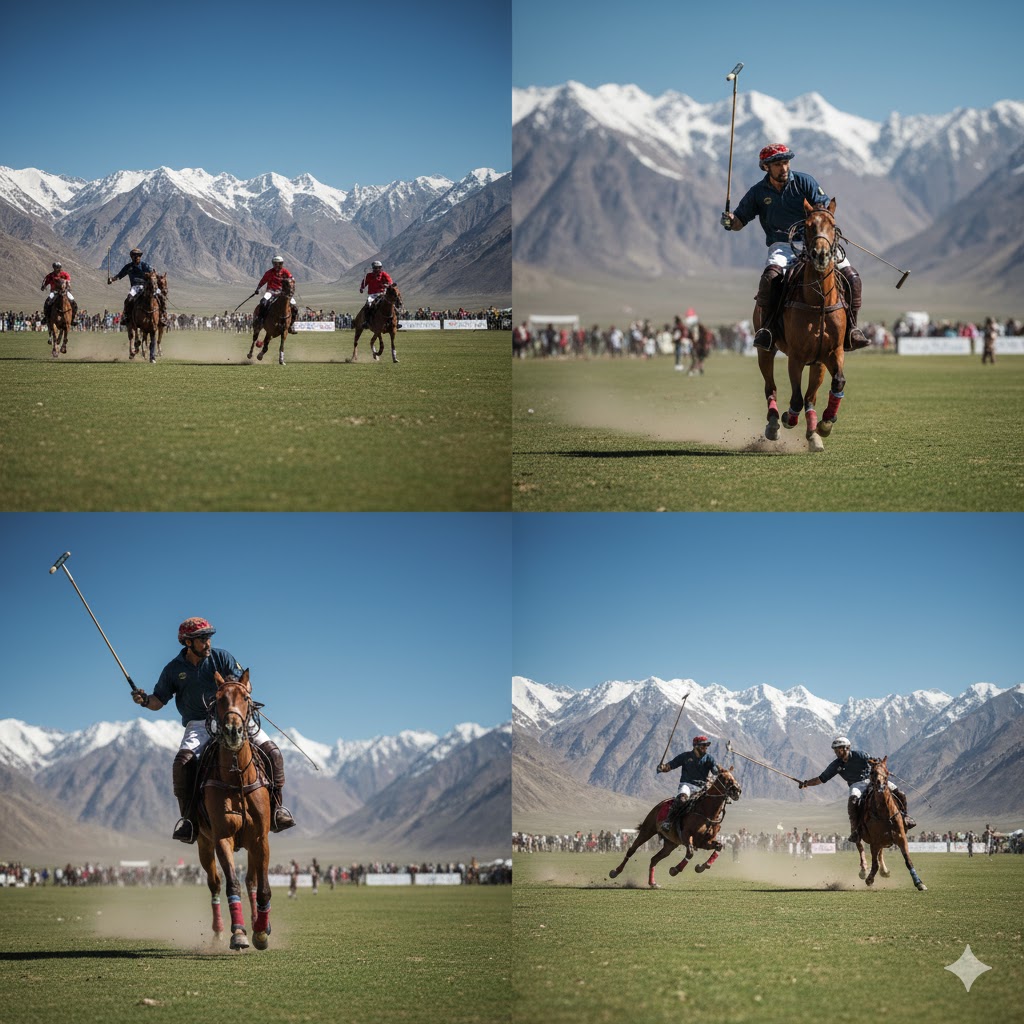
🕊️ 4. Navroz Festival — The Spiritual New Year of the Mountains
Location: Hunza, Nagar, Gilgit, and Skardu
Dates: 21st March 2026
Derived from Persian roots, Navroz celebrates the Ismaili New Year, marking spiritual and agricultural renewal. In the high valleys of Hunza and Nagar, villagers decorate homes with white fabrics symbolizing purity, exchange flowers, and share Diram Phitti as a token of peace.
Communities gather at Jamat Khanas (community centers) to recite devotional poetry and perform traditional Satrangi dances, representing unity across colors and regions.
Highlights:
- Special prayers for harmony and good harvests.
- Local sports and music add joy to the spiritual atmosphere.
- Homes open to guests in an act of communal sharing.
Travel Details:
📍 Main Venues: Karimabad (Hunza), Yasin Valley (Ghizer), Skardu Town.
🎟️ Entry: Open to all (guests should dress modestly).
🛏️ Stay: Serena Hunza or Mountain Lodge Skardu.
💡 Hidden Gem: Try Harissa — a slow-cooked delicacy prepared only during Navroz.
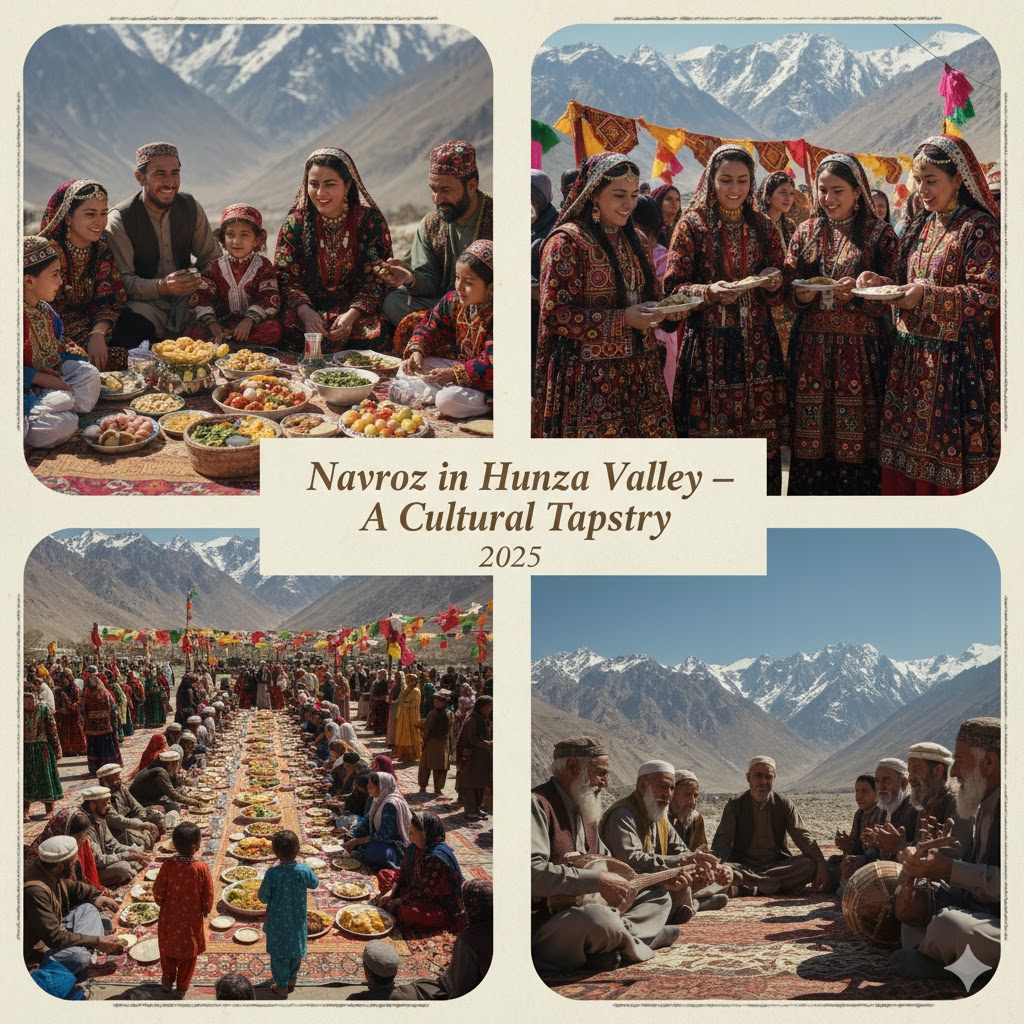
🌸 5. Jashn-e-Baharan — Swat’s Festival of Flowers and Revival
Location: Saidu Sharif & Malam Jabba, Swat Valley
Dates: 25th–28th March 2026
Jashn-e-Baharan (Festival of Spring) welcomes the season of blossoms and peace in the “Switzerland of the East.”
The festival brings together cultural parades, folk dances, horse shows, and traditional Swati embroidery stalls. The valley bursts with cherry and apricot blossoms, painting a living watercolor of renewal.
Artists from across Khyber Pakhtunkhwa perform at open-air stages, while local vendors offer handmade crafts and trout-based cuisine from nearby rivers.
Highlights:
- Attan dance performed by local tribes.
- Ski shows and zipline activities at Malam Jabba.
- Photography and flower contests sponsored by KP Tourism.
Travel Info:
🎟️ Entry: Free.
🛏️ Stay: Pearl Continental Malam Jabba or Swat Continental Hotel.
🚗 Access: 4.5 hrs from Islamabad via M-16 Expressway.
💡 Local Tip: Visit before 10 a.m. for soft morning light perfect for blossom photography.
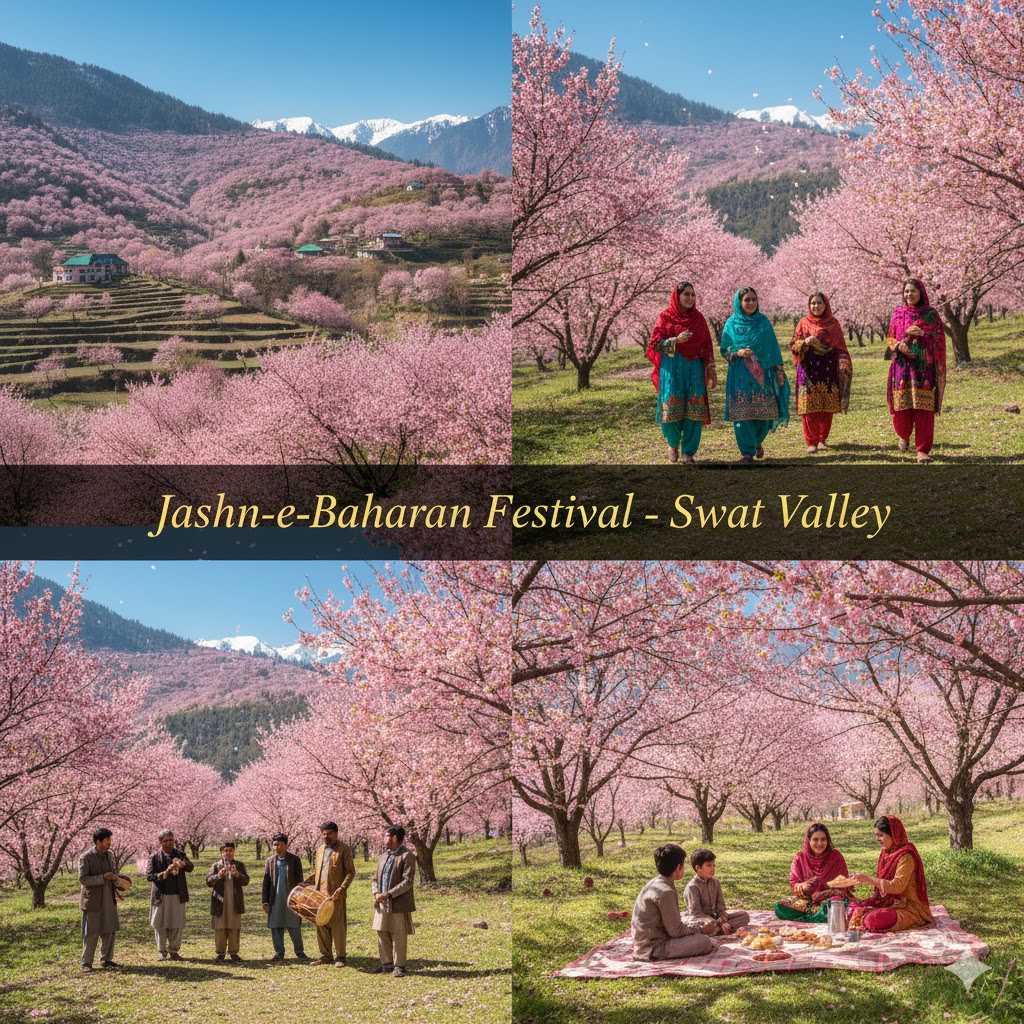
🕍 6. Silk Route Festival — Colors of Ancient Trade
Location: Gilgit City
Dates: September 2026
Celebrating the cultural diversity of ancient traders, the Silk Route Festival showcases Pakistan’s northern artistic legacy.
It brings together craft stalls, gem traders, mountaineers, and cultural troupes from Gilgit, Hunza, Skardu, and Nagar.
Music, artisan displays, and heritage documentaries remind visitors that Gilgit once linked empires — from China to Persia.
Highlights:
- Handicrafts, gemstones, and mountain cuisine stalls.
- Folk performances from multiple ethnic groups.
- Workshops on sustainable tourism and heritage protection.
Visitor Info:
🎟️ Entry: Free, open to international tourists.
🛏️ Stay: Gilgit Serena Hotel or Riverdale Resort.
🚗 Access: 20 minutes from Gilgit Airport.
💡 Hidden Gem: Don’t miss the Shina Folk Ensemble performance at sunset — it’s mesmerizing.
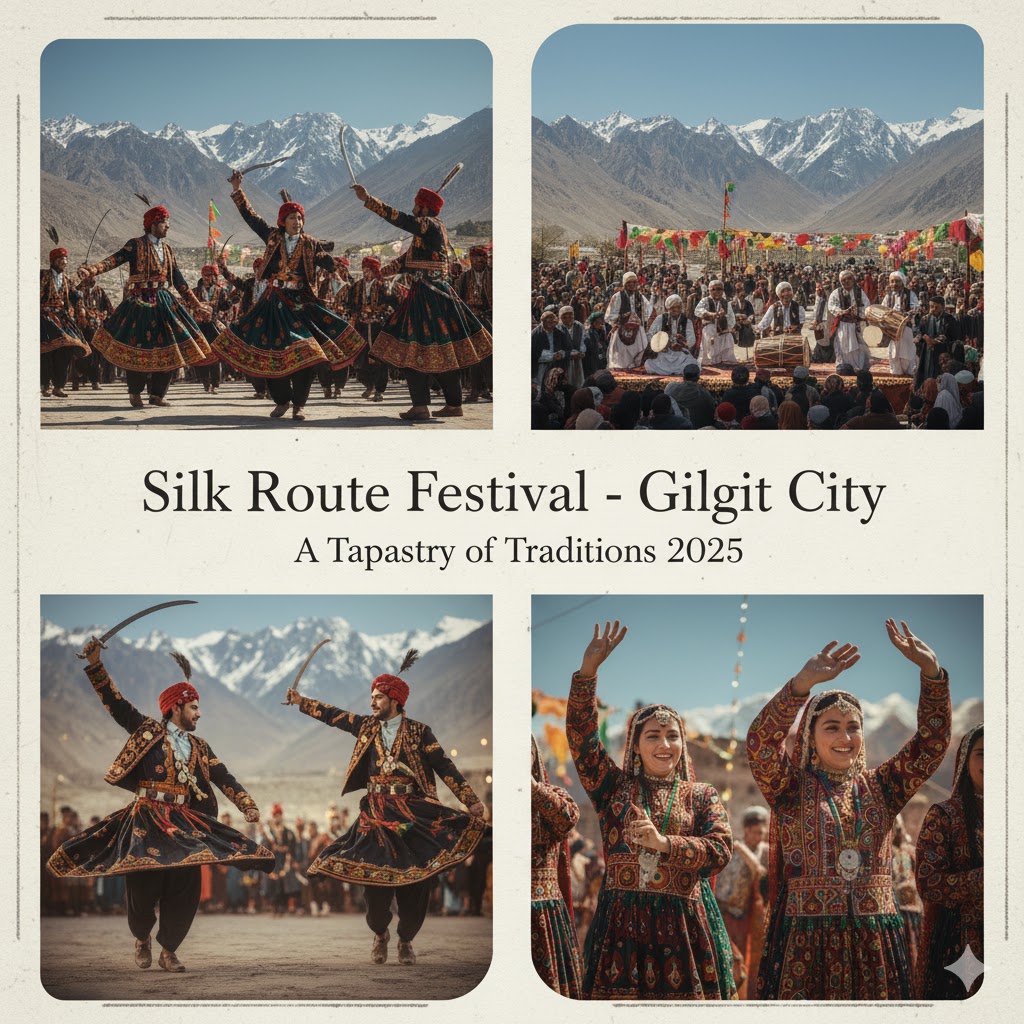
7. Baba Ghundi Festival — The Sacred Gathering of Upper Gojal
Location: Misgar Valley, Upper Hunza (Gojal)
Dates: 20th–22nd August 2026
Hidden deep in the mountains near the Pak-China border, the Baba Ghundi Festival celebrates the saint Baba Ghundi, revered for bringing Islam and blessings to the region.
Every year, locals and shepherds descend from the Pamir pastures to pay tribute at the saint’s shrine, bringing offerings of milk, butter, and handmade woolen items.
The event merges spirituality with high-mountain celebration — polo matches, yak races, and cultural performances fill the air with joy. Pilgrims often camp under starry skies while folk musicians play daman drums till dawn.
Highlights:
- Spiritual prayers and collective feasts (Langar).
- Free yak races and polo tournaments.
- Women’s handicraft stalls featuring embroidered caps (Khapol).
- Camel caravan parades reenacting ancient Silk Route trade rituals.
Visitor Info:
📍 Main Venue: Baba Ghundi Shrine, Misgar Valley.
🎟️ Entry: Free (community donations encouraged).
🛏️ Stay: Pamir Serai Guesthouse or Misgar Eco-Camp.
🚗 Access: 2 hours from Sost (last border town).
💡 Local Tip: Arrive early morning — limited road access after 10 a.m. due to mountain winds.
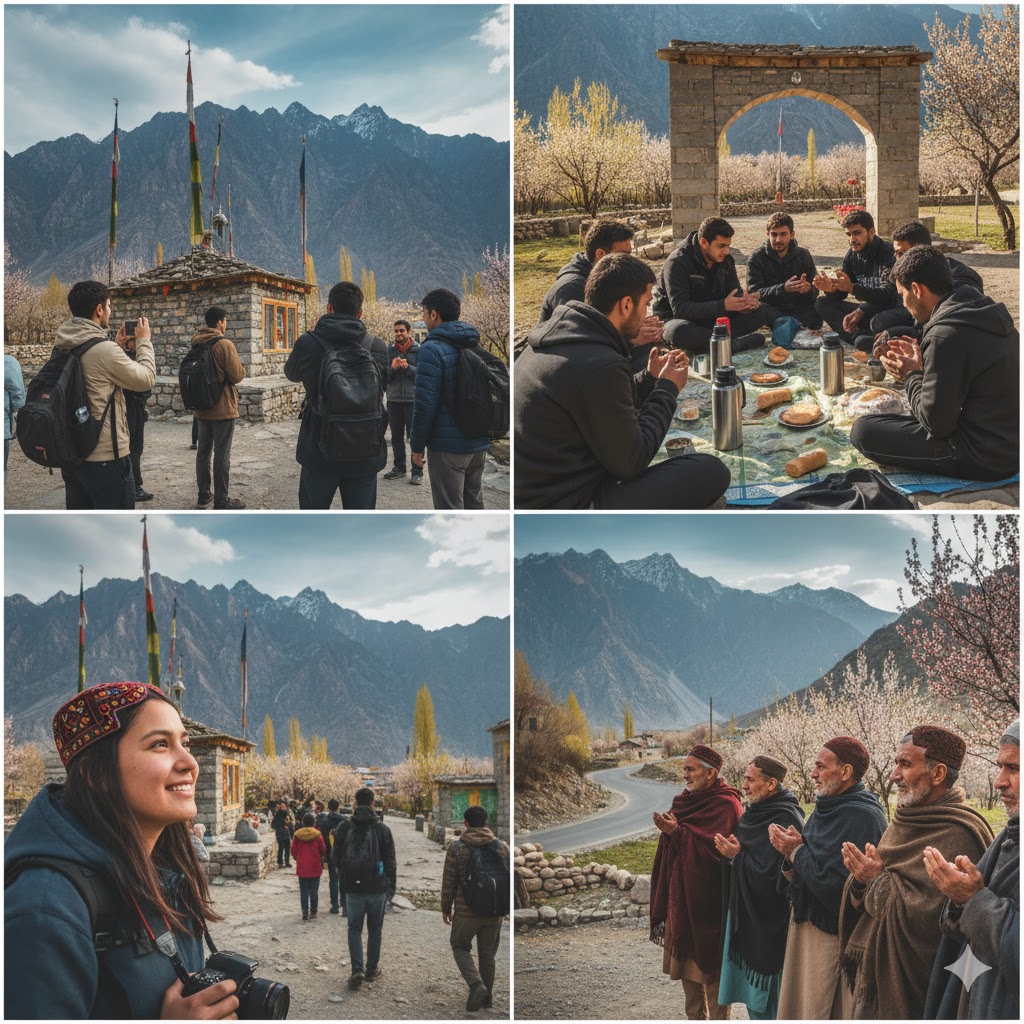
🎠 8. Babusar Summer Festival — Northern Gateway Celebration
Location: Babusar Top (Kaghan–Chilas border)
Dates: 10th–12th July 2026
Perched above 13,700 feet, Babusar Top connects the green Kaghan Valley with the rugged Karakoram landscape. Each July, this natural pass hosts a three-day summer festival organized by Gilgit-Baltistan Tourism Department.
Traditional horse races, jeep rallies, folk dances, and trout barbecue contests celebrate the region’s unspoiled beauty.
Visitors gather around campfires at night while local singers perform Pashto, Hindko, and Shina songs, creating an unforgettable mix of languages and laughter under a sky full of stars.
Highlights:
- Horse polo and jeep rally competitions.
- Artisan stalls selling wooden crafts and hand-knit scarves.
- “Babusar Food Street” offering local trout, apricot juice, and naan kebabs.
- Photography exhibitions of mountain wildlife.
Travel Tips:
🎟️ Entry: Free for all travelers.
🛏️ Stay: Camping or basic lodges in Naran (2 hrs drive).
🚗 Access: From Naran via N-15 Highway (jeep required).
💡 Hidden Gem: Stop at Lulusar Lake en route — mirror reflections at sunset are breathtaking.
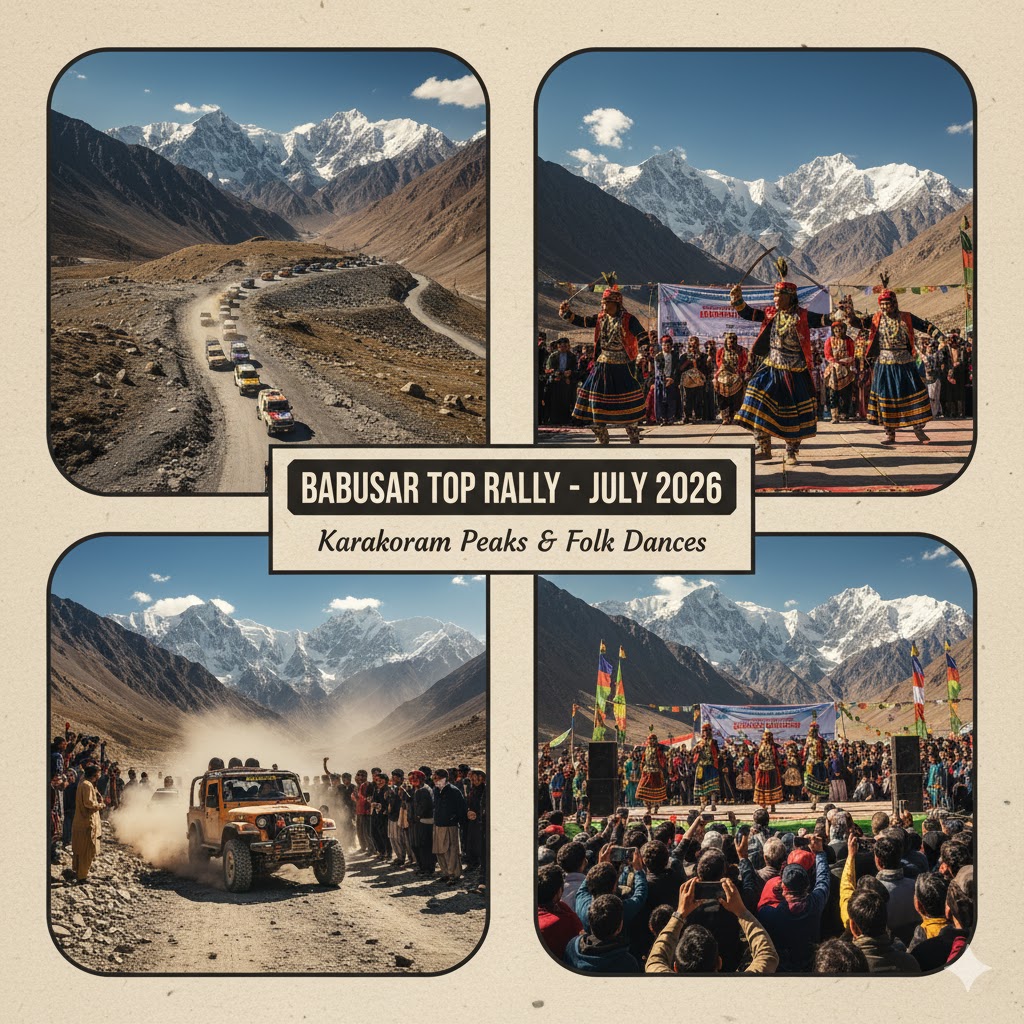
🧭 9. Karakoram Cultural Festival — Voices from the Mountains
Location: Skardu, Baltistan
Dates: 18th–21st September 2026
The Karakoram Cultural Festival is one of the newest yet most ambitious mountain festivals in Pakistan. It unites artisans, climbers, and musicians from all across the northern belt.
Set against the mighty Kharpocho Fort backdrop, the event celebrates the cultural resilience of mountain communities.
From Balti throat singing (Yo-Khoro) to traditional weaving and the display of antique mountaineering gear, every element reflects the region’s fusion of heritage and adventure.
Highlights:
- Balti dance and Yo-Khoro musical performances.
- Documentary screenings on glaciers and mountain ecology.
- Exhibition of old mountaineering tools and rare photographs.
- International climbers’ panel on preserving high-altitude culture.
Travel Info:
🎟️ Entry: Rs. 500 (local) / Rs. 1500 (foreign visitors).
🛏️ Stay: Hotel One Skardu or Shigar Serena Fort.
🚗 Access: 45 minutes from Skardu Airport.
💡 Local Insight: Attend the “Night of Lights” ceremony at the fort terrace — it’s Baltistan’s most magical evening event.
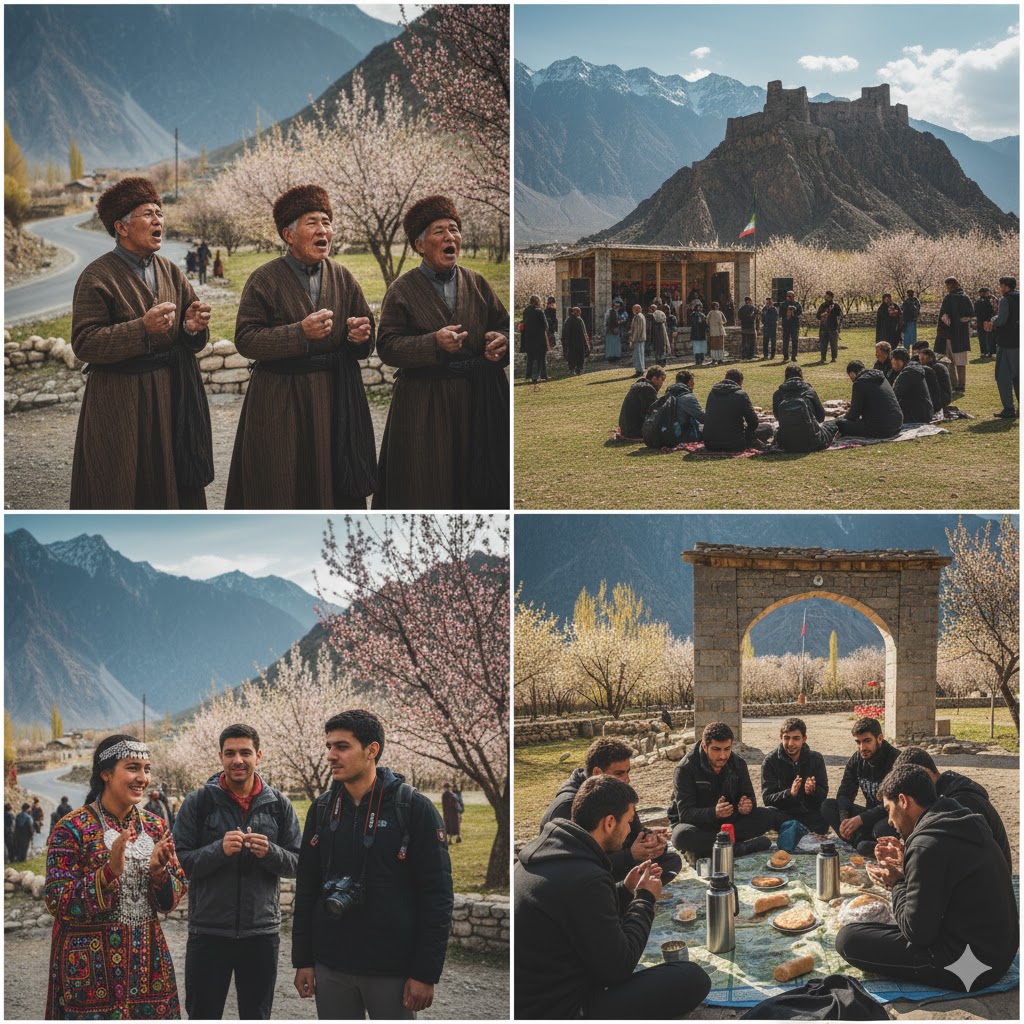
🧡 10. Baltoro Adventure Festival — Gateway to K2
Location: Askole Village, Baltistan
Dates: 25th August 2026
This adventurous event takes place at Askole, the last human settlement before the K2 base camp trek. The Baltoro Adventure Festival is both a tribute to mountaineering and a cultural welcome to climbers from around the world.
Locals from Braldu Valley gather to honor guides, porters, and sherpas who have braved the glaciers for generations.
Traditional Balti dishes like Gyaling (deep-fried bread) and Thukpa (spiced noodle soup) are shared, while mountaineers exchange stories of courage and survival.
Highlights:
- Traditional Balti music with mountain backdrop.
- Trekking workshops led by local guides.
- Environmental awareness seminars promoting glacier conservation.
- Charity stalls supporting porter education.
Travel Info:
🎟️ Entry: Free, open to trekkers and tourists.
🛏️ Stay: Camping only — local families offer home-cooked meals.
🚗 Access: Jeep road from Skardu (7–8 hrs).
💡 Hidden Gem: Visit the “Porters’ Stone Monument” near Askole — a humble tribute to Baltistan’s unsung mountain heroes.
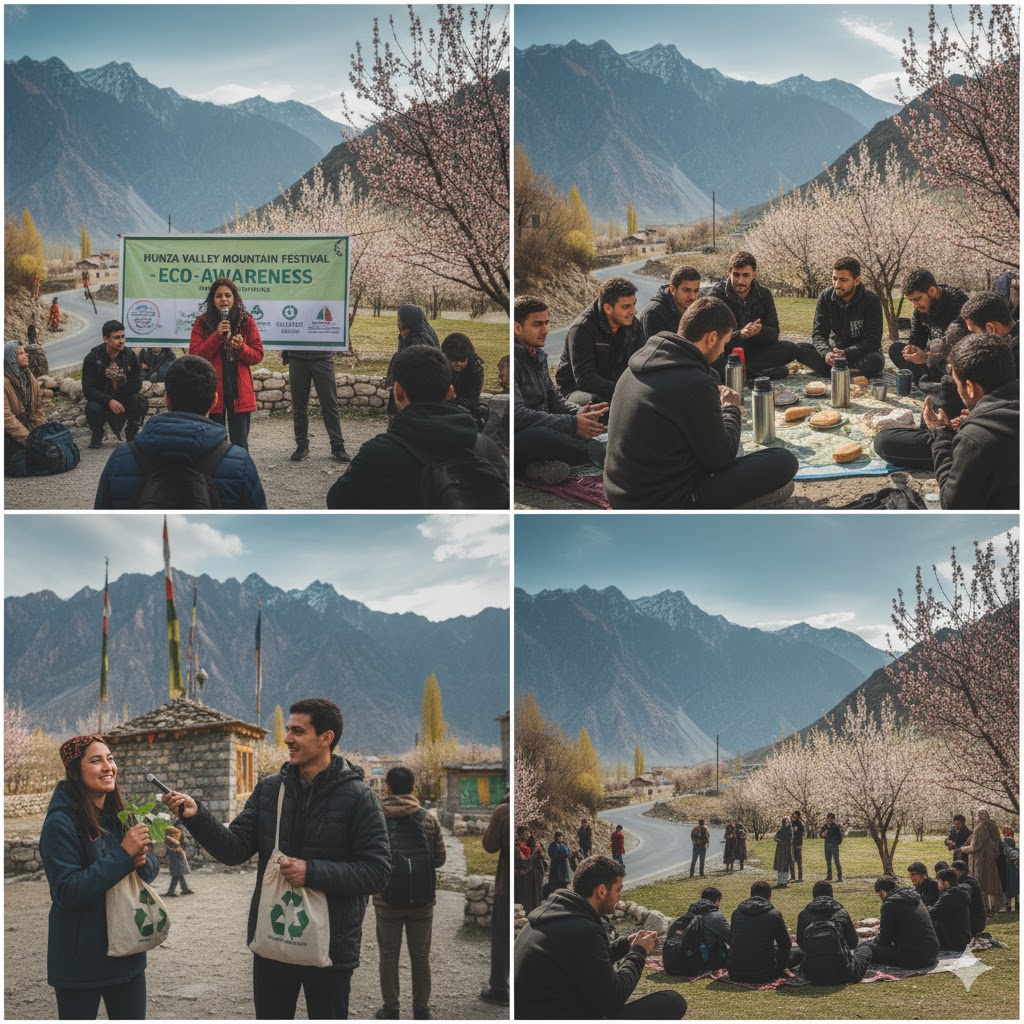
🌍 11. Eco-Tourism & Responsible Travel in Mountain Festivals
Pakistan’s mountain festivals are not only a reflection of culture — they are a lifeline for eco-tourism and local economies. The communities of Gilgit-Baltistan, Hunza, and Chitral are increasingly adopting green tourism principles to preserve their natural and spiritual environments.
- Use eco-lodges or homestays instead of commercial hotels.
- Buy directly from artisans to sustain traditional crafts.
- Avoid littering; carry reusable water bottles.
- Participate in local cleanup drives organized during festivals.
Local NGOs such as Himalayan Life and Baltit Heritage Foundation work actively to promote sustainable cultural tourism — ensuring that these breathtaking festivals continue for generations.
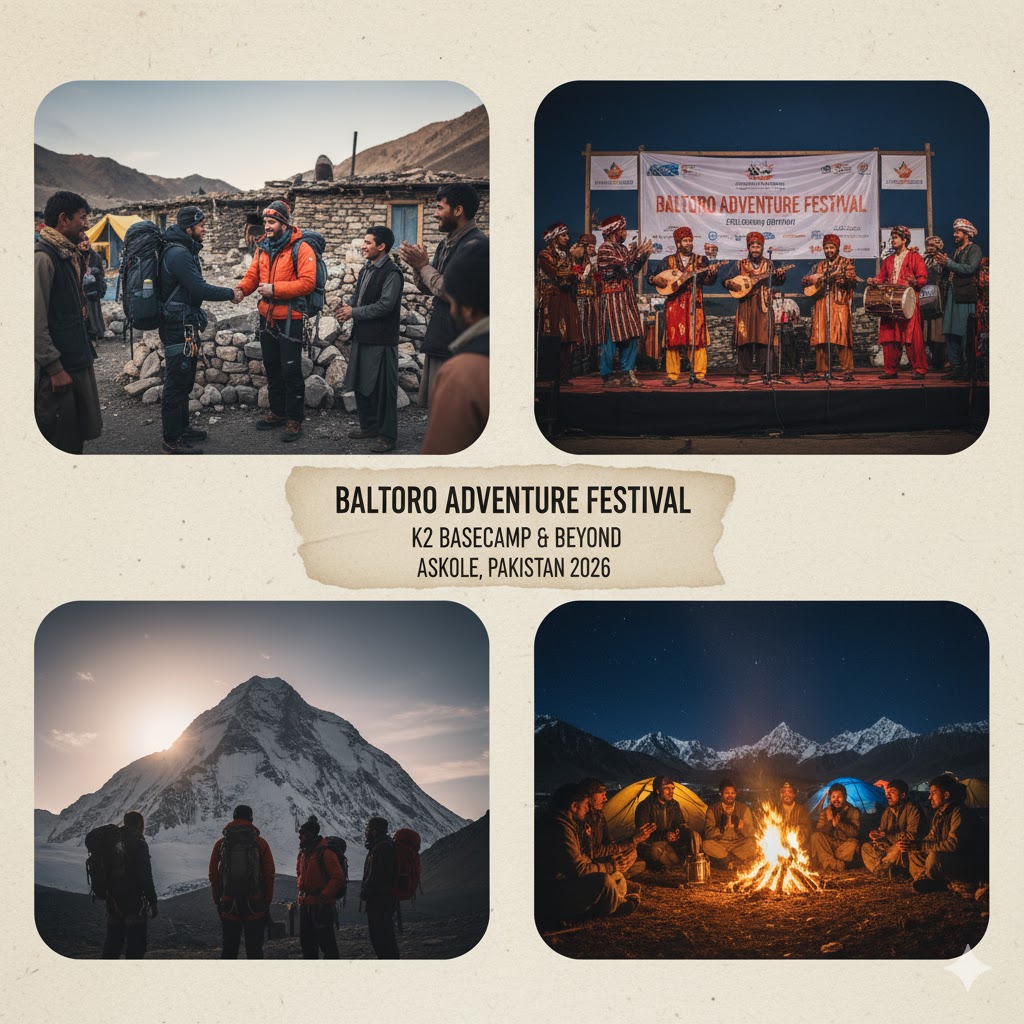
💬 Local Expert Insights
“Every festival in the mountains is a living museum — one that breathes through music, color, and community spirit. The people of Hunza, Gilgit, and Chitral don’t just host visitors; they welcome them into centuries-old traditions,”
— Samar Khan, Pakistani cyclist and mountain culture advocate.
“Sustainability is not just an idea here — it’s a lifestyle. Our festivals honor the land, so we protect it,”
— Ali Ahmad, Cultural Guide, Gilgit-Baltistan Tourism Board.
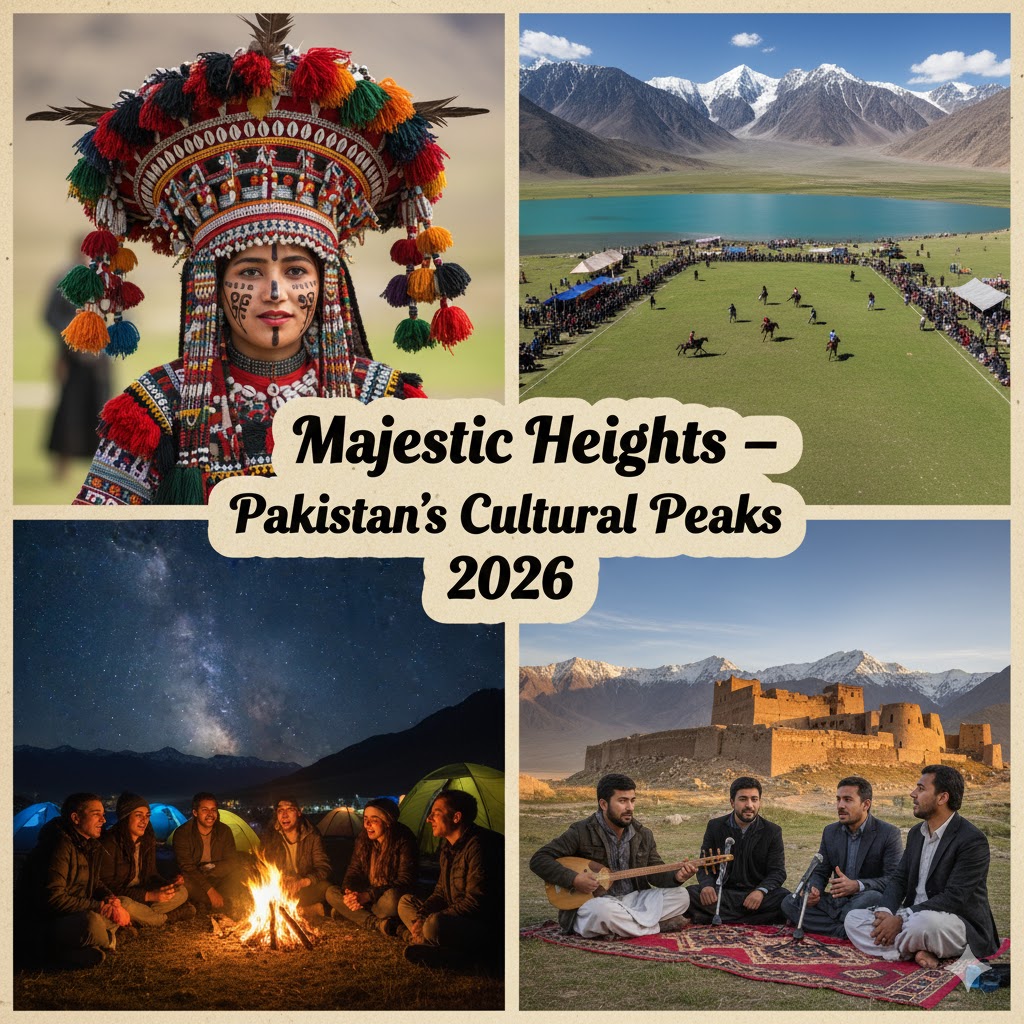
FAQs — Most Beautiful Pakistan Mountain Festivals (2026)
Q1. Which is the most famous mountain festival in Pakistan?
The Shandur Polo Festival in Gilgit-Baltistan is the most famous, celebrated at the “Roof of the World.” It attracts thousands of visitors for polo matches, folk music, and a celebration of mountain brotherhood.
Q2. When is the best time to visit Pakistan’s mountain festivals?
Between May and September, when most valleys are accessible and festivals like Chilam Joshi, Ginani, and Babusar Summer Festival take place in pleasant weather.
Q3. Are Pakistan’s mountain festivals safe for tourists?
Yes, most festivals are family-friendly and secure. Local authorities and tourism boards provide safety patrols and visitor guidance, especially in Hunza, Skardu, and Chitral.
Q4. What should I pack for attending a mountain festival?
Pack warm clothing, comfortable trekking shoes, sunscreen, and a reusable water bottle. Don’t forget your camera — the landscapes are breathtaking.
Q5. Do foreigners need a permit to visit northern festivals?
For regions like Hunza, Skardu, and Chitral, no special permit is required. However, areas near Khunjerab and Gojal may need temporary visitor registration (handled by local tourism offices).
Q6. Can I stay with local families during festivals?
Yes! Many valleys offer community homestays where tourists can experience authentic mountain hospitality, local food, and folklore storytelling.
Q7. What’s the most unique festival experience in Pakistan’s mountains?
The Baba Ghundi Festival in Upper Gojal stands out for its mix of spirituality, culture, and adventure — surrounded by dramatic glaciers and ancient caravan routes.
Q8. How are these festivals helping promote eco-tourism?
By encouraging waste-free zones, sustainable food practices, and handmade crafts instead of plastic souvenirs, festivals are making eco-tourism part of mountain culture.
ALT Text: Tourists attending cultural awareness session during a mountain eco-festival in Hunza
Must See:
- Hunza Heritage Guide 2026: Valley of Legends and Eternal Beauty
- Explore Kalash Cultural Adventures 2026: Rituals and Colors of the Hindu Kush
External Links:
- Pakistan Tourism Development Corporation (PTDC) – Official Events Calendar
- UNESCO Intangible Cultural Heritage – Pakistan
Traveler Guide — The Call of the Mountains
From the roaring polo grounds of Shandur to the silent glaciers of Baltoro, Pakistan’s mountain festivals are more than celebrations — they are living museums of human resilience and joy.
Each beat of the drum, each dance, each bonfire in the mist carries an echo of centuries-old faith, courage, and gratitude to nature.
As you travel through these highlands, remember: these festivals don’t just welcome visitors — they awaken the soul.
Whether you trek to Kalash, witness Hunza’s harvest, or camp in Skardu under the stars, the mountains promise both adventure and reflection — a harmony only Pakistan’s peaks can offer.

